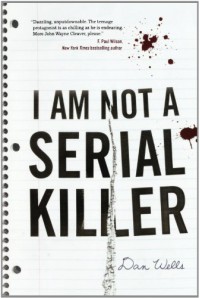Nyssa's Reading Life
I like books. Well-written books, which generally excludes most YA (sorry, everybody). I edit literary fiction in my spare time, and I eat up books with great prose and no pretentiousness. I also love good speculative fiction and frequently read classics.
Currently reading
Heresies of Nature - Margaret Blair Young

Surprisingly enough, this book was actually my first foray into Mormon literature. I mean, I've read Brandon Sanderson, but he didn't really address questions of LDS faith or culture in his books. (Except for the very end of Hero of Ages, when it's Mormon cosmology like crazy. But anyway.) Though I went in hesitant about how Young would treat her faith in this novel, I actually thought it was handled beautifully for the most part.
The story: Middle-aged Ben meets a hippie-spiritualist woman named Cody in Zion National Park, who convinces him that she can use her ability to read people and sense others to help Ben's wife, Merry, who is in the last stages of terminal multiple sclerosis. When Cody enters Ben's house, we see the tensions that surround Merry, her MS, and her slow dwindling over the years. Her teenage daughters love their mother but, despite Merry's yearnings to be one, don't have much of a mother figure. Ben loves his wife but has grown weary of the constant care she requires. And Merry, in full posession of her mental faculties, has to watch the tension around her--the tension that springs from her. Cody helps the family interpret Merry's feelings about the situations as they try to work through the major issues in their lives.
Overall, the writing was exactly what the story needed it to be: gorgeous and heart-breaking, but never verging into schmaltzy. And though I knew how the story must end, I still wept copiously during Merry's last scene. Though this volume is thin, it makes great use of its simple and powerful prose to really help you understand the effect that a disease like MS can have on a family.
I have two small complaints about this book: the first is that in a few scenes, Cody got too weird and unbelievable as she was trying to help Ben through his sexual needs that weren't being met. She overstepped her bounds in a way that left me more creeped out and turned off from the story than concerned about the characters that were Cody's way. My second small complaint is that the end seemed to be grasping for significance but not quite achieving it. Yes, it makes use of a symbol that had been set up artfully through the rest of the story, but it didn't feel quite whole enough to be a completely satisfying ending image.
Despite these small issues, I would highly recommend this book to anyone who wants to read Mormon literature or literature about disability. It's a quick read, and it's more powerful than you might expect.
Poison Study
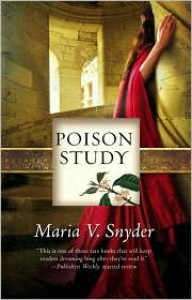 More like 1.5 stars, but my gosh, this book was sloppy. So many different and unrelated elements to the story, a grievous misunderstanding of the difference between show and tell, and several characters built solely on tropes or basic wish fulfillment. And the gender bending stuff was completely unnecessary and comically separate from the rest of the story. No bueno.
More like 1.5 stars, but my gosh, this book was sloppy. So many different and unrelated elements to the story, a grievous misunderstanding of the difference between show and tell, and several characters built solely on tropes or basic wish fulfillment. And the gender bending stuff was completely unnecessary and comically separate from the rest of the story. No bueno.
The Emperor's Soul
 Probably Branderson's weakest book. Does not have the same structure of rules that he follows so well in his Mistborn Trilogy, and any setups he does seem to have weak payoffs in quick succession. The main character wasn't all that intriguing, but Gaotona wasn't bad. He's kind of what kept me reading through it all. His arc is really the only arc present in the entire book, which is kind of a shame. I can see what Branderson was trying to accomplish here, but it didn't feel true to his writing style and therefore lacked a lot.
Probably Branderson's weakest book. Does not have the same structure of rules that he follows so well in his Mistborn Trilogy, and any setups he does seem to have weak payoffs in quick succession. The main character wasn't all that intriguing, but Gaotona wasn't bad. He's kind of what kept me reading through it all. His arc is really the only arc present in the entire book, which is kind of a shame. I can see what Branderson was trying to accomplish here, but it didn't feel true to his writing style and therefore lacked a lot.
On Moral Fiction
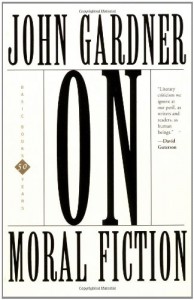 The first half of this book was an eye-opening perspective for an English major ensconced in literary theory for the majority of her college education. But the second half was downright pernicious--willing to put up with the supposed madness of artists who have so much moral rectitude that they can scorn the way other people live. And it descended into mediocre philosophy while it was at it, departing for the most part from the realm of concrete literature.And I worry about how he interprets literature in the first place. He made much reference to the Iliad, but I feel like he got it all wrong. He saluted Achilles, disparaged Priam, said that the Greek military ethos should be something we still hold to today. Excuse me? That is perhaps the weakest reading of the poem that I've encountered, and he would have it be prescriptive in life today. Though this book had a consistent goodness to the first half, it was moments like this that made me worry about it.
The first half of this book was an eye-opening perspective for an English major ensconced in literary theory for the majority of her college education. But the second half was downright pernicious--willing to put up with the supposed madness of artists who have so much moral rectitude that they can scorn the way other people live. And it descended into mediocre philosophy while it was at it, departing for the most part from the realm of concrete literature.And I worry about how he interprets literature in the first place. He made much reference to the Iliad, but I feel like he got it all wrong. He saluted Achilles, disparaged Priam, said that the Greek military ethos should be something we still hold to today. Excuse me? That is perhaps the weakest reading of the poem that I've encountered, and he would have it be prescriptive in life today. Though this book had a consistent goodness to the first half, it was moments like this that made me worry about it.
Henry V (Folger Shakespeare Library Series)
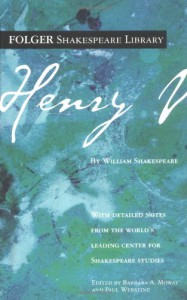 This is my first Shakespeare history play, and I was not disappointed. There were a few flaws with this play that detracted from its overall flow and structure (too much about the glove and the leek, and a gratuitously long fifth act after the battle had finished), but there were of course some great speeches. Really good stuff.
This is my first Shakespeare history play, and I was not disappointed. There were a few flaws with this play that detracted from its overall flow and structure (too much about the glove and the leek, and a gratuitously long fifth act after the battle had finished), but there were of course some great speeches. Really good stuff.
Paternal Tyranny
 This is a difficult book to rate because I read it not for edification or enjoyment as much as I did for historical study. Basically, this is the arguments of an enraged nun against involuntary cloistering of women that apparently was taking place in early modern Italy.I won't take time to summarize all her arguments, but by the end of it, I realized that debates like this are kind of pointless on both sides--any time you take a stand for symbolic significance of something, the other side can just as easily flip the symbol around. So yes, there was a lot of deconstruction going on in early modern Italy, and it can get tiresome to read after a while.
This is a difficult book to rate because I read it not for edification or enjoyment as much as I did for historical study. Basically, this is the arguments of an enraged nun against involuntary cloistering of women that apparently was taking place in early modern Italy.I won't take time to summarize all her arguments, but by the end of it, I realized that debates like this are kind of pointless on both sides--any time you take a stand for symbolic significance of something, the other side can just as easily flip the symbol around. So yes, there was a lot of deconstruction going on in early modern Italy, and it can get tiresome to read after a while.
The Aeneid (Fitzgerald translation)
 I wish I had read a different translation of this poem. Fitzgerald's version, though it had good rhythm throughout, was kind of lifeless in its diction and syntax. I don't believe in making old things artificially feel old in translation, and I think Fitzgerald is very guilt of that. Overall, it was hard to keep my interest in the book. For many chapters, I had to read the poem aloud to keep my attention from drifting.
I wish I had read a different translation of this poem. Fitzgerald's version, though it had good rhythm throughout, was kind of lifeless in its diction and syntax. I don't believe in making old things artificially feel old in translation, and I think Fitzgerald is very guilt of that. Overall, it was hard to keep my interest in the book. For many chapters, I had to read the poem aloud to keep my attention from drifting.
The Taming of the Shrew (The New Folger Library Shakespeare)
 This was a weird play, certainly not my favorite of Shakespeare's comedies, which I usually don't enjoy as much as the tragedies anyway. I'll have to see if my academic work on the play changes my opinion at all. I might rate higher if it lends itself to fun research.
This was a weird play, certainly not my favorite of Shakespeare's comedies, which I usually don't enjoy as much as the tragedies anyway. I'll have to see if my academic work on the play changes my opinion at all. I might rate higher if it lends itself to fun research.
Renegade Women: Gender, Identity, and Boundaries in the Early Modern Mediterranean
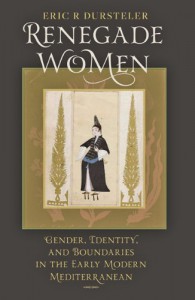 I wish there was more to this book, because by the end, I was fascinated. Dursteler did some meticulous research and presented three stories of women at the locus of politics, religion, and gender relations. Makes me want to learn about the Mediterranean more.
I wish there was more to this book, because by the end, I was fascinated. Dursteler did some meticulous research and presented three stories of women at the locus of politics, religion, and gender relations. Makes me want to learn about the Mediterranean more.
The Shell Collector: Stories
 I don't know what I was expecting from this book, but I wasn't expecting to like it as much as I did. I am usually wary of literary fiction that dwells so much on nature; sometimes these stories feel like they abandon story and human resonances for their description and exultation in unqualified nature. But Doerr didn't have this problem, and I think these stories taught me better how to exist. Most of the stories were thoughtful and intricate, and I found myself getting lost in these meditations. Some of the prose was painfully beautiful, but nothing felt like it was begging for my emotions, demanding my sadness.Doerr's strength in this collection is maintaining his compassion for human characters even as they find themselves in the extremes of nature and the wilderness. Though Doerr could have lifted his attention from people to focus on the grandeur of snowbanks and hibernating animals, he was careful to maintain the complex balance required of presenting humans interacting with nature--growing closer to it, distancing themselves from it, and trying to return to it. The details that Doerr uses are gently precise, able to convey the subtle nuances of people trying to shift and settle into their places in the world, chafing at the discomfort when they grow out of this place.This book made me seriously reconsider my reading taste. I had to think back to better-known books I had read recently, books that I was initially excited about but that grew stale in my memory. The Shell Collector, in contrast, has aged well, has grown itself into my thoughts and composure. Though the stories are not explicitly moral, reading the book was an edifying experience, one that left me a more contemplative and discerning person. I recommend.
I don't know what I was expecting from this book, but I wasn't expecting to like it as much as I did. I am usually wary of literary fiction that dwells so much on nature; sometimes these stories feel like they abandon story and human resonances for their description and exultation in unqualified nature. But Doerr didn't have this problem, and I think these stories taught me better how to exist. Most of the stories were thoughtful and intricate, and I found myself getting lost in these meditations. Some of the prose was painfully beautiful, but nothing felt like it was begging for my emotions, demanding my sadness.Doerr's strength in this collection is maintaining his compassion for human characters even as they find themselves in the extremes of nature and the wilderness. Though Doerr could have lifted his attention from people to focus on the grandeur of snowbanks and hibernating animals, he was careful to maintain the complex balance required of presenting humans interacting with nature--growing closer to it, distancing themselves from it, and trying to return to it. The details that Doerr uses are gently precise, able to convey the subtle nuances of people trying to shift and settle into their places in the world, chafing at the discomfort when they grow out of this place.This book made me seriously reconsider my reading taste. I had to think back to better-known books I had read recently, books that I was initially excited about but that grew stale in my memory. The Shell Collector, in contrast, has aged well, has grown itself into my thoughts and composure. Though the stories are not explicitly moral, reading the book was an edifying experience, one that left me a more contemplative and discerning person. I recommend.
The Hunger Games (Hunger Games Series #1)
 Does not live up to the hype. Collins does not know how to write a taut narrative. There is little to no foregrounding in this story--different facts come into play right when they're needed, or at most 30 pages before they need to make their appearance. Katniss was an insufferably stupid character (it can't be THAT hard to believe that Peeta has a crush on you), and I really did not like the first-person present perspective of the novel. There wasn't enough description of things I was actually interested in (what the Capitol actually looks like) and way too much of things I really don't care about (food, showers, outfits). The entire book feels like it's rushing too quickly toward a climax too feeble to carry the supposed weight of the story.In brief, I see a lot of reviews on this page praising how quickly they had to finish the book, but I maintain that the time it takes you to finish a book is not a sign of its quality. I finished the book in a 24-hour period because the narrative was paper-thin, the story simplistic. The book told me what I was supposed to be thinking all the time, so of course that sped things along, but I hated every supposed revelation from Katniss. It all felt so formulaic. Just as a bad song can be catchy, a bad book can be a page-turner.The movie was a far better and more exciting take on this story, mostly because I didn't have to listen to Katniss's internal monologuing. I am going to be reading forward, however, because I want to find out what Mockingjay is all about and why so many people get upset about it. I'm hoping that if people generally love the first two books and hate the third one, I'll find something worthwhile to get out of the last installment in the trilogy. We'll see.
Does not live up to the hype. Collins does not know how to write a taut narrative. There is little to no foregrounding in this story--different facts come into play right when they're needed, or at most 30 pages before they need to make their appearance. Katniss was an insufferably stupid character (it can't be THAT hard to believe that Peeta has a crush on you), and I really did not like the first-person present perspective of the novel. There wasn't enough description of things I was actually interested in (what the Capitol actually looks like) and way too much of things I really don't care about (food, showers, outfits). The entire book feels like it's rushing too quickly toward a climax too feeble to carry the supposed weight of the story.In brief, I see a lot of reviews on this page praising how quickly they had to finish the book, but I maintain that the time it takes you to finish a book is not a sign of its quality. I finished the book in a 24-hour period because the narrative was paper-thin, the story simplistic. The book told me what I was supposed to be thinking all the time, so of course that sped things along, but I hated every supposed revelation from Katniss. It all felt so formulaic. Just as a bad song can be catchy, a bad book can be a page-turner.The movie was a far better and more exciting take on this story, mostly because I didn't have to listen to Katniss's internal monologuing. I am going to be reading forward, however, because I want to find out what Mockingjay is all about and why so many people get upset about it. I'm hoping that if people generally love the first two books and hate the third one, I'll find something worthwhile to get out of the last installment in the trilogy. We'll see.
A Canticle for Leibowitz
 Hmm. I had a really hard time getting through this book for whatever reason. It didn't feel like much was connected until I had time to think about the last two chapters, which were amazing, and totally worth the other 300 pages. I imagine this is a book that would benefit from a second reading. Maybe someday.
Hmm. I had a really hard time getting through this book for whatever reason. It didn't feel like much was connected until I had time to think about the last two chapters, which were amazing, and totally worth the other 300 pages. I imagine this is a book that would benefit from a second reading. Maybe someday.
The Fault in Our Stars
 *MINOR SPOILERS*For me, the first part of this book was a bit rocky. I've heard people complain before that the main characters seem too smart for their ages, but that wasn't really the problem I had. Some of the dialogue exchanges were just too "precious" for me. For instance, I don't think it's that remarkable to form an adjective from a three-syllable noun, but Augustus makes a big deal out of when Hazel does it. In such moments I was acutely aware that I was reading YA.The book really hit its stride, though, once Hazel and Augustus meet Peter Van Houten. At this point, almost all forced "quirkiness" is abandoned, and the characters became far more real and likable for me. No, I didn't cry, but the book hurt so good to read. If I were to reread it, I would probably start from the Amsterdam trip.
*MINOR SPOILERS*For me, the first part of this book was a bit rocky. I've heard people complain before that the main characters seem too smart for their ages, but that wasn't really the problem I had. Some of the dialogue exchanges were just too "precious" for me. For instance, I don't think it's that remarkable to form an adjective from a three-syllable noun, but Augustus makes a big deal out of when Hazel does it. In such moments I was acutely aware that I was reading YA.The book really hit its stride, though, once Hazel and Augustus meet Peter Van Houten. At this point, almost all forced "quirkiness" is abandoned, and the characters became far more real and likable for me. No, I didn't cry, but the book hurt so good to read. If I were to reread it, I would probably start from the Amsterdam trip.

![The Filter Bubble: What the Internet Is Hiding from You 1st (first) edition by Pariser, Eli published by Penguin Press HC, The (2011) [Hardcover] -](http://booklikes.com/photo/max/50/80/upload/books/f/c/azure_fcb9ec8c27badfb8202e5a38971a1869.jpg)





